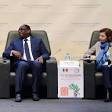From our special correspondent, Dominique Mabika
The Dakar International Forum on Peace and Security, the 7th in its history, opened on December 6 in Diamniadio, 30 km from Dakar, the Senegalese capital. Placed under the theme of the issues of stability and emergence in Africa in a post-Covid-19 world, the forum saw African heads of state and senior officials of African and European institutions succeed one another in the courtroom on themes of peace and security, on the Covid-19 pandemic.
Since 2014, the Dakar Forum has been held to diagnose the situation in Africa in order to help find solutions to the ills that affect it. For the 7th edition, discussions revolved around Covid-19, described as one of the worst emergencies of the century.
In this quest for solutions, Senegalese President Macky Sall said that in addition to internal efforts to mobilize resources, global economic governance must be rethought to promote the conditions for financing emergence in Africa.
“In my opinion, the reforms should cover at least six areas, in particular, relax the OECD rules for export-credit loans and extend the maturities for the financing of development infrastructure projects; correct the rules for assessing investment risk in Africa, since the perception of this risk is always higher than the real risk, which increases insurance premiums and reduces the competitiveness of our economies; further promote blended finance, combining concessional funds and commercial finance; streamline and simplify the procedures for examining project financing files, while respecting transparency rules; ensure a fair and equitable energy transition, according to the Principle of common but differentiated responsibility; improve the rules of the international tax system so that tax is paid where wealth is created, that is, in the country where a company operates and makes its profits. ”
This meeting, which since its establishment has become a platform for discussion on issues of peace and security in Africa, is intended as a space that brings together, promotes reflection and offers solutions.
With this in mind, Cyril Ramaphosa, President of the Republic of South Africa, denounced the travel restrictions imposed by Western countries on Africans. Mohamed Bazoum, President of the Republic of Niger, made a surgical presentation of the insecurity in the Sahel and shared his country’s experience.
For his part, Moussa Faki Mahamat, Chairman of the African Union Commission, expressed his indignation at the policy orchestrated by part of the international community. “Would terrorism in Syria and Iraq be worthy of being fought and defeated, while terrorism in Africa is not? The international community is far from being proud of its action in the fight against terrorism in Africa “. Continuing in the same vein, the chairman of the AU commission raised a number of questions before appealing for solidarity among Africans.
“What have we done to make us today the continent where terrorism is rampant and unconstitutional changes multiply? It is high time to ask the implacable simple but fatal question: why have we come to this? A first response must be sought within ourselves in the deficit of African solidarity. In most cases, African states are watching the scene, some are looking away. The needs of victims of terrorism are well within the reach of some relatively well-off African states.
When this solidarity manifested itself in the intervention of Chad in favor of Mali and its neighbors on Lake Chad, of Rwanda in favor of the CAR, or of SADEC in favor of Mozambique, everyone saw the difference. The financial support given to the G5 Sahel by Rwanda, Côte d’Ivoire, ECOWAS, Senegal and UEMOA is a fine example worth following. This very limited experience shows that African solidarity in the struggle for peace and security is possible, that it can be swift and effective “.
On the side of the European Union, finding together strategic and political convergences with a view to a common service for peace and security in a particular context, requires changing the paradigm of the partnership between Africa and Europe, by favoring exchanges in mutual respect.
France took part in this Dakar meeting alongside all security actors in Africa. It centralized its point of view on the pooling of efforts. “Our two continents have a community of destinies, we must act together in a more integrated manner in the face of the security challenges that we must meet. This forum is the time to work collectively with courage without falling into the trap of division. Divided we fall, united we stand firm ”, underlined Florence Parly, Minister of the Armed Forces of the French Republic.
The Dakar 2021 Forum, in addition to serving as a platform for discussions for a stable and sufficiently resilient Africa in the face of global crises, enabled the private sector, study organizations and the world of the arts, to present their activities and the result of their research, through the organization and animation of stands, exhibitions and other side events



